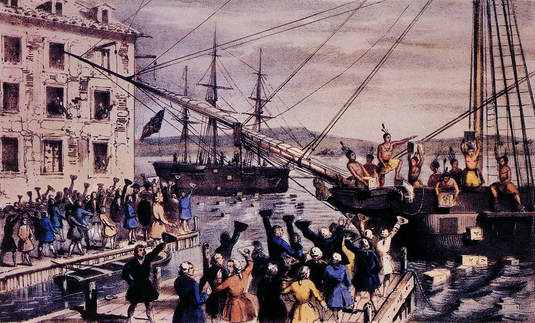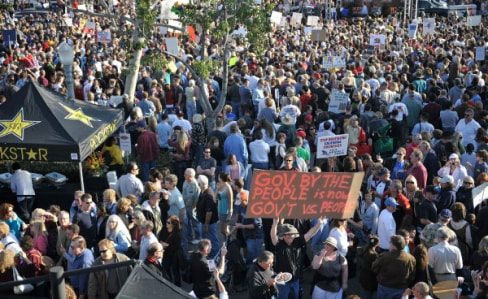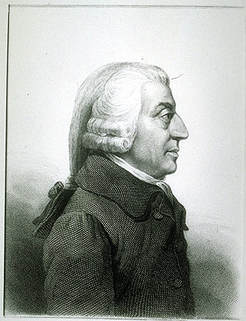|
Do you remember when the Tea Party was a thing? Yeah, me ummm, kinda... Anyways, here's a piece I thought was a pretty interesting that I wrote for SwiftEconomics.com on the original Tea Party in 1773 as well as the Tea Party protests back when Obama was in office that were sort of a precursor to Trumpism. Anyways, I hope you enjoy: There has been an awful lot of coverage lately regarding tea party protests springing up around the country. Named after the famous Boston Tea Party, hundreds of rallies took place across the country on April 15th, bringing large numbers of people together to protest taxes, reckless spending, bailouts and all the rest of our government’s recent behavior. FOX News is basically in love with these protesters. And for the most part, I sympathize with the protesters. But I’m just not a big fan of Fox’s incredible “fairness” and “balanced-ness,” which makes feeling sympathy a little tough for me. Luckily for me, MSNBC, whom I am not a fan of either, seems to hate the tea parties about as much as FOX loves them. Maybe I should just pick a side and be a mindless cheerleader. So much less thinking involved. Regardless, Keith Olbermann, among others, has been referring to the protesters as “tea baggers.” Which is a bit graphic, especially for the prime time news. (For those of you who don’t know what tea bagging is, the act occurs when a man inserts his scrotum into… you know what, if you’re really that curious, just look up the wikipedia article on it. Wow, I just linked to the definition of tea bagging: a new low for SwiftEconomics.com. My sincerest apologies Ryan.) Anyways, on April 16th, Keith Olbermann continued his uninterrupted streak of guests, who disagree with him on absolutely nothing, by speaking with actor and renowned political philosopher, Janeane Garofalo. She proceeded to describe the tea party protesters as follows: “Let’s be very honest about what this is about. It’s not about bashing Democrats. It’s not about taxes. They have no idea what the Boston Tea Party was about. They don’t know their history at all. This is about hating a black man in the White House. This is racism straight up. That is nothing but a bunch of tea bagging rednecks. There is no way around that.” (1) Hmmm, stereotyping an entire group of people based on one thing, that reminds me of something. Damn, why can’t I put my finger on it? Regardless, Janeane Garofalo is probably right about one part, the tea party protesters almost certainly don’t know what the Boston Tea Party was actually about. Although, I sincerely doubt she has the slightest idea either. So what was the Boston Tea Party about? Well, of course it was a tax protest that foreshadowed the glorious American Revolution, which pitted the freedom loving (and slave owning) Americans, against the ruthless and tyrannical British Empire (who we’d later become BFF’s with). Now I hate to take your 5th grade history textbook to task, but no, the Boston Tea Party was not an early call to independence. It wasn’t even a tax protest. It was in many ways, of all things, a tax-cut protest. I’ll let historian Niall Ferguson explain: “…most people assume [the Boston Tea Party] was a protest against a hike in the tax on tea. In fact the price of tea in question was exceptionally low, since the British government had just given the East India Company a rebate of the much higher duty the tea had incurred on entering Britain. In effect, the tea left Britain duty free and had to pay only the much lower American duty on arriving in Boston. Tea had never been cheaper in New England. The ‘Party’ was organized not by irate consumers but by Boston’s wealthy smugglers, who stood to lose out.” (2) That isn’t to say it was just a bunch of smugglers throwing a hissy fit; it’s certainly more complicated than that. To get at the full story, let’s start by discussing the motivations behind the American Revolution. The main reason for the Revolution boiled down to two interconnected grievances. The first was that the British were centralizing control over the colonies. This was where we get the whole ‘taxation without representation’ bit. The colonists believed it was unfair for the British Parliament to tax them, since they had no say on who was elected to the British Parliament. Instead, they felt colonial officials should make these decisions. This represented what Niall Ferguson calls a “tacit tug of war between centre and periphery – between royal authority in London… and the power of the colonists’ elected assemblies.” (3) The British had previously ruled the colonies in a lackadaisical fashion. After the French and Indian War ended in 1763, the British gained a substantial amount of new territory and began to clamp down. As historian Joseph Ellis put it, ” Now, however, the sheer scale of [the British’s] recently acquired American empire, plus the sudden recognition that governance of its expanded domain required more management than a few secretaries in Whitehall could muster, forced a major overhaul in this accidental empire into something more appropriately imperial.” (4) The British became more controlling, and the method they used to control the colonies brings us to the second grievance; an inequitable economic system known as mercantilism. Mercantilism, when the term is rarely used today, is thought of as just a synonym for protectionism. It is much more than that however; mercantilism could best be defined as a loose connection of economic and political philosophies, which conclude that a country becomes richer by exporting as much as possible and importing as little as possible. The goal is to amass gold and silver bullion, Scrooge style. This is what leads a country to enact trade barriers, grow an empire to control resources and manage its own economy in a myriad of other ways. What this means is that the host country (Britain) will try to profit at the expense of its colonies (America’s) instead of trying to cooperate with them. As my previous article shows, this makes absolutely no sense. However, it was the accepted economic philosophy of the era. Mercantilism came under attack during the enlightenment by classical liberals (basically modern libertarians with an egalitarian streak). Adam Smith’s The Wealth of Nations, was not, as many seem to assume, a defense of the current system, but instead, one of the first and most thorough, assaults on the mercantilist ideology. An ideology that, as Smith wrote: “For the sake of that little enhancement of price, which this monopoly might afford our producers, the home consumers have been burdened with the whole expence of maintaining and defending that empire… It cannot be very difficult to determine who have been the contrivers of this whole mercantilist system; not the consumers, we may believe, whose interest has been entirely neglected; but the producers, whose interest has been so carefully attended to.” (5) Oh, those Scottish Enlightenment writers, so polite all the time. Let me be a little more blunt. Mercantilism sees all nations in conflict with each other. Thus coercion, not cooperation, is necessary for economic growth. So simply put, mercantilism is an awful system. Well, I guess it’s only awful if you don’t like its main side effects, namely: hyper-protectionism, ultra-nationalism, a merger between corporate interests and the state, cronyism, colonialism, oppression, racism, slavery and near-constant war. All of which characterized that unfortunate period in our history, and are closely related to mercantilism (see here, here and here).
The American Revolution, besides being a war for political control, was also an uprising against British mercantilism, or at least certain aspects of it (Stamp Act, Navigation Acts, etc.). In fact, one indictment against King George, in the Declaration of Independence, was “For cutting off our Trade with all parts of the world.” (6) This referred to the East India Company getting monopoly privileges on trade, a very mercantilist policy if there ever was one, instead of letting the colonists trade of their own accord. So mercantilism is totally weak and the colonists didn’t like it, but how does this play into the Boston Tea Party? Well simple, mercantilism creates ample opportunities for smugglers. High, protective tariffs raise the price of consumer goods and thereby create a market for cheaper, smuggled goods. Think of Al Capone during prohibition. He was the last person to want the 18thamendment repealed; his profits depended on alcohol being illegal. The same thing goes for tea smugglers just prior to the Revolutionary War. In 1773, the British passed the Tea Act, which eliminated many duties on the East India Company, in an attempt to save the company from bankruptcy. The act also gave the company more monopoly privileges over trade with the Americas. The monopoly privileges and what amounted to corporate welfare certainly angered the colonists, and helped lay the groundwork for the revolution. Ironically though, the smugglers benefited from the British’s mercantilistic policies in the same way that Al Capone benefited from prohibition. The tariffs allowed the smugglers to sneak in Dutch tea and sell it for less than the British. Since the new act would lower the East India Company’s costs, and thereby its prices, the smuggler’s profits would be reduced. So while it’s impossible to know exactly why, on December 16th, 1773, several dozen men (most of them smugglers), stormed aboard the Dartmouth and threw 342 chests of tea in the water; but they were presumably more upset about the British undercutting their profits, than about any sort of perceived oppression. Even more ironically, the Boston Tea Party, while not embodying the spirit of the Revolution, was used as a rallying cry for it. While the smugglers were mostly just interested in protecting their bottom line, Samuel Adams and others defended it passionately, as a principled protest against an unjust system. This was compounded further when the British clamped down even harder on the colonies, going as far as closing Boston Harbor, which lead to more resentment among the colonists, until it boiled over in 1776. Alright, enough with the history lesson. Well I guess all this article really is, is a history lesson. Regardless, to return to the modern protests, it is a bit ironic that they would name their protests after what was mostly just a bunch of smugglers pissed off about what amounted to a tax cut. Well if Obama is actually going to cut taxes on everyone making less than $250,000, which I highly doubt, then maybe it does make sense after all. Or as long as everyone just believes their 5th grade textbook, the protesters should be fine. _____________________________________________________________________________________________ (1) Number 2 Story with guest Jeanne Garofalo, Countdown with Keith Olbermann, MSNBC, April 16, 2009, http://hotair.com/archives/2009/04/16/garofalo-outdoes-herself-tea-parties-all-about-white-power-says-d-lister/ (2) Niall Ferguson, Empire: The Rise and Demise of the British World Order and Lessons For Global Power, Pg. 72, Basic Books, Copyright 2002 (3) Ibid., Pg. 73 (4) Joseph Ellis, American Creation: Triumphs and Tragedies At the Founding of the Republic, Pg. 23, Random House Inc., Copyright 2007 (5) Adam Smith, The Wealth of Nations, Pg. 841, Bantam Books, Copyright 2003, Originally Published 1776 (6) “DECLARATION OF INDEPENDENCE,.” 2009. The History Channel website. 18 Apr 2009, 01:36 http://www.history.com/encyclopedia.do?articleId=207252
Comments
|
Andrew Syrios"Every day is a new life to the wise man." Archives
August 2018
Blog Roll
Bigger Pockets REI Club Tim Ferris Joe Rogan Adam Carolla MAREI Worcester Investments Entrepreneur The Righteous Mind Star Slate Codex Mises Institute Tom Woods Consulting by RPM Swift Economics Categories |



 RSS Feed
RSS Feed


